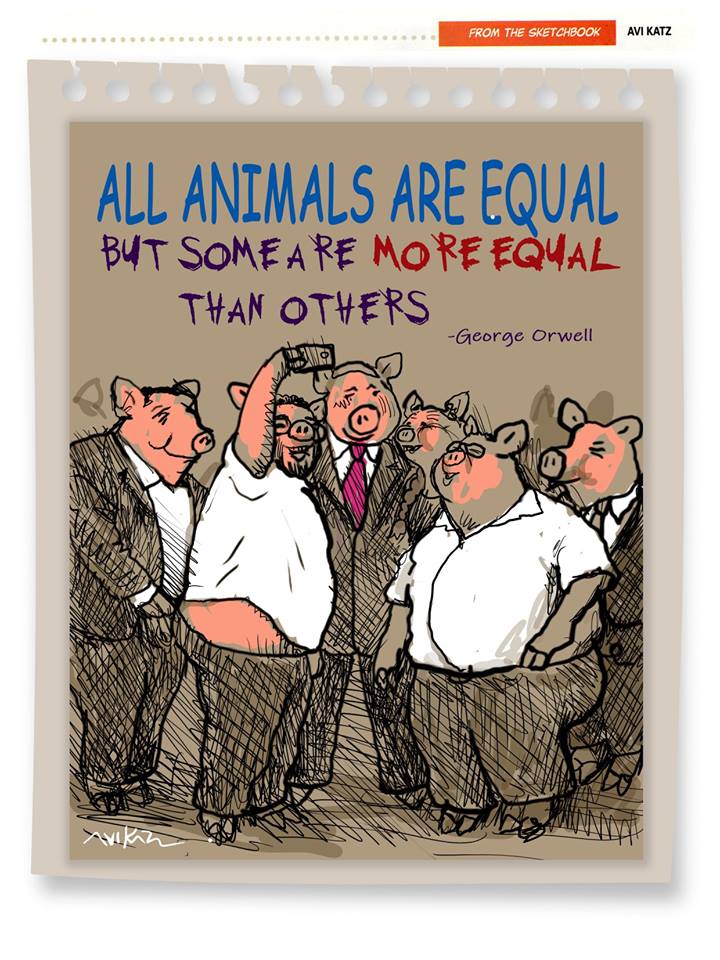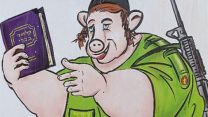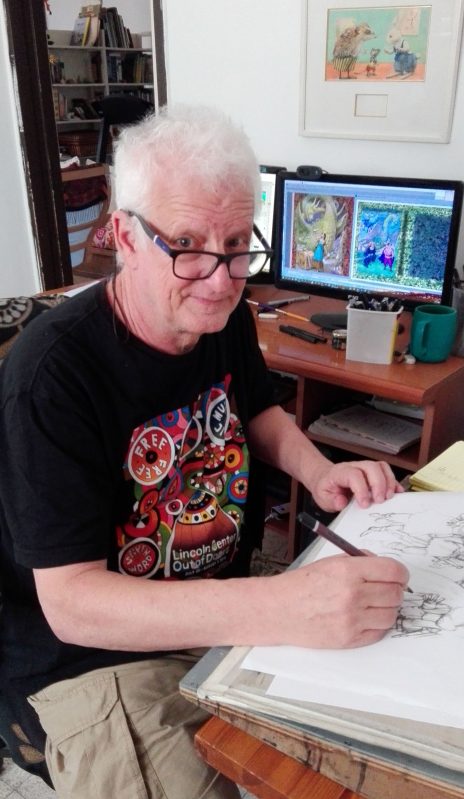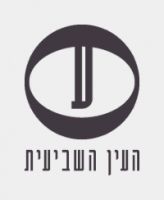Avi Katz, the cartoonist let go by ‘The Jerusalem Report’ over a caricature depicting Netanyahu and Likud lawmakers as characters from ‘Animal Farm,’ talks about what happened behind the scenes, why accusations of anti-Semitism are so off-base, and what the saga says about freedom of expression in Israel today.
By Oren Persico

Avi Katz wasn’t even in Israel when the cartoon was published. He was in the United States, where he was born, visiting his children. A few days earlier, he had realized his deadline was approaching for the weekly cartoon he publishes in The Jerusalem Report, called “Sketchbook,” and that he hadn’t yet sent anything to his editors.
“I went over the news and I saw Fitoussi’s photograph of the selfie and I broke out laughing,” Katz says, referring to Associated Press photographer Olivier Fitoussi’s photo, initially published in Haaretz, showing Benjamin Netanyahu and some of the more radical and oft-ridiculed lawmakers from his Likud party celebrating the passage of the Jewish Nation-State Law in the Knesset. Netanyahu appears forlorn, MK Oren Hazan is smirking, and the latter’s belly is exposed as he raises his arm to take the selfie.
“I said to myself, I don’t need to do a caricature, the caricature already exists,” Katz recalls, “and I decided to do the easy thing. It’s like telling someone else’s joke and you hope you don’t mess it up too much. I drew the photo the same way they were positioned and standing in it, Hazan and [David] Bitan and the rest, and I drew them as pigs. On the top half of the page, in large letters, I wrote the George Orwell quote and then I sent it.”
Jerusalem Report editor Steve Linde (formerly editor-in-chief of The Jerusalem Post) immediately wrote back saying thank you, Katz recalls. Something along the lines of, “Great, I was worried you weren’t going to make the deadline.” Soon after, Katz says, “they sent the cartoon to print and it appeared in the magazine.”
The quote, as anyone who has read the book would immediately recognize, is taken from Orwell’s Animal Farm, a satirical allegory of the Soviet Union that takes place on a farm controlled by the pigs, who explain to the other animals that although all the animals are equal, some animals are more equal than the rest.
To Katz, the parallels between the discrimination anchored in the Jewish Nation-State Law and the discrimination that comprises the pigs’ regime in Animal Farm are simply too obvious. But it seems not everyone understood his cartoon’s jab — or perhaps they understood it a little too well.
Did you have a sense that this cartoon would stir up trouble?
“I had a feeling that there would be some letters to the editor saying that I am anti-Semitic. That has happened in the past, and it’s not a big deal. People have also on occasion sent me letters and included their email addresses and I’ve written back to them and we had discussions until we understood one another, which was nice. The Jerusalem Report doesn’t really have the type of vulgar and witless comment section you see in some other media outlets. I didn’t usually get cursed out — but there would sometimes be claims that what I was doing wasn’t okay and that I don’t get it.”
But this time it turned out differently.
“First of all, this time, instead of the 30-40 likes that I would usually get when I put my cartoons on Facebook, it very quickly reached hundreds of likes. I was really surprised but then I got a Messenger message from Steve Linde, who said that he’s really sorry and that it made him uncomfortable, but that there had been very negative reactions and that he was under a lot of pressure from management which he couldn’t stand up to, and that they told him not to commission any more cartoons from me. It wasn’t framed as a firing because I am a freelancer — he explained that they were just going to stop commissioning cartoons from me.”
Did he say who in management putting the pressure on him?
“No. That’s a question I asked a lot: who made the decision? I asked Steve, I asked other people I know who are close to management of The Post, but nobody knew exactly who it was — who gave the order.”
Indeed, The Jerusalem Post Group, owned by media mogul Eli Azur, has not given any answers about the decision to part ways with Katz. A request by the Israel Press Council to “clarify the circumstances and reasons” surrounding the decision to end Katz’s employment also went unanswered.
‘Anti-Semitic? Nonsense’
From the moment that Katz was told that his services would no longer be required, the whole episode took a sharp turn. According to Katz, the comments came flooding in on Facebook when he posted about his firing — mostly supportive messages.
“From that moment,” Katz says, “instead of a few hundred comments and shares, there were thousands, and very soon after that articles started appearing in all sorts of unexpected places. Not only The Guardian and CNN. There was an article about it in an Indian newspaper and a Turkish paper and even something in Africa — I don’t remember which country. The whole world suddenly jumped on the cartoon and the story of my firing and I was astounded. I thought there would be a few reactions: after all, a good caricature evokes a reaction and sparks discussion. That’s the work.”
Why do you think the reaction was so harsh this time?
“I’ve been criticizing the government and its policies for quite some time now — and I’m not the only one who does so — and they don’t shut you down for that. It’s not because I criticize Bibi or even Sara, what they do in the [occupied Palestinian] territories, corruption, or whatever it may be. People want that criticism so that we can all laugh at those in power, which they deserve.”

“This was something else. I know that the whole thing about the pigs is very sensitive, even though the claim that were are anti-Semitic motives is nonsense. The world over, anti-Semitism has never used a ‘Jews are pigs’ trope and Jews were never depicted as pigs. What’s funny is that after I drew the caricature I got something like 20 different emails in a condescending tone explaining that ‘maybe I didn’t really understand the sensitivity here, but look at this drawing of a Jew as a pig and then try to understand that anti-Semites use that depiction a lot and I can show you many other examples.’ The example that they all sent, every one of them, was a specific illustration of a pig in an IDF uniform with a yarmulke and side locks, with an M16 on his back, holding the Babylonian Talmud in his hand. I live next to Bnei Brak (an ultra-Orthodox city outside of Tel Aviv) and I know that illustration. It comes from the ultra-Orthodox protests against being drafted into the Israeli army.”
“For Christians, of course, pigs aren’t an insult. It’s a farm animal, a tasty one. You don’t have to get it special food and they reproduce nicely. In the darkest of anti-Semitic times the Europeans loved pigs. They don’t have anything against pigs. It’s true that there’s a traditional Christian image called Judensau, which depicts Jews sucking the teat of a large pig. The image tries to claim that Jews are wealthy not because they deserve to be or that they worked for it themselves, but rather because they suckle their prosperity. But even there the pig is a symbol of prosperity. The pig isn’t the Jew. There is no such anti-Semitic tradition. It doesn’t exist.”
It wasn’t only in the Facebook comments that Katz was accused of anti-Semitism. A few days after the decision to fire him was handed down, The Jerusalem Post’s editorial board published an editorial arguing that the cartoon crossed the lines of legitimate discourse. “The swine image is reminiscent of antisemitic memes used against Jews throughout history,” the Post‘s editorial stated. “Just recently, a Hamas-affiliated scholar said, ‘Allah has transformed Jews into pigs and apes.’ We, a Zionist newspaper, cannot accept this demeaning analogy.”
“Nonsense,” Katz insists. “It does not exist. It’s all in their heads.”
Katz, born in 1949, came to study art in Israel after he had already begun his studies in the United States to avoid being drafted into the American army during the Vietnam War. After he finished his studies at Bezalel Academy in Jerusalem he he found himself moving into the world of illustrations and caricatures in newspapers and other publications. He worked for a who’s-who of now-defunct Israeli newspapers and magazines over the years, along with a few that are still in business, all while making a living illustrating children’s books and English-language textbooks.
He also worked as an illustrator for The Jerusalem Post. In 1990, a group of Post journalists, unhappy with the direction the newspaper was taking after it was bought by new owners, left the daily paper and started The Jerusalem Report. Katz was part of that founding group. His illustrations were in the first edition of The Report and his drawings were published in its pages ever since. He primarily did illustrations for articles on politics, society, technology, as well as book and restaurant reviews.
“I had a lot of fun,” he recalls, “because the magazine’s art director, Tina Silverman, let me experiment with different styles. There is an idea according to which one needs to establish a consistent illustration style in a newspaper, but she had a different appraoch. ‘As much diversity as possible,’ she said, ‘so the reader doesn’t know its’ the same illustrator.’” Katz worked part-time for The Report, even after the magazine changed hands a number of times, eventually when it was bought by The Jerusalem Post, from which it had originally broken off all those years earlier. “We joined them for business reasons,” Katz emphasizes, “but they promised that The Report would remain independent.”

Indeed, he says, he was never told to shelve a cartoon or to stay away from a certain topic. There were, however, a few times when his editors would tell him that his illustration wasn’t appropriate for the article it was supposed to accompany. For instance, he was once asked to illustrate an article that justified the settlements and the occupation. “In my illustration the settlers appeared a little psychotic,” he admits. “It was pretty clear that I don’t like them.” In that case, he says, he didn’t have any complaints about how the magazine handled it. “If I’m illustrating someone else’s article, I’m the accompanying pianist, not the soloist. I can’t dominate.”
Ten years ago he received a personal column in The Report, where he was given a free hand to draw whatever he wanted. In his column, Katz says, the editors never intervened. “Nobody ever told me ‘the opinions you’re expressing are too radical’ or ‘too personal’ or ‘too left-wing.’ They knew what my worldviews are.”
When Katz published the caricature with the pigs, however, he wasn’t even a part-time employee anymore. Under the ownership of Eli Azur, The Jerusalem Post implemented far-reaching cuts in its publications. Katz was among those who were laid off (“I received severance according to the law. There were a lot of layoffs at the time and I didn’t take it personally.”), and for a few months The Report stopped publishing his illustrations.
However, he says, the readers demanded his return. After more than a few letters arrived asking what had happened to Katz, he was brought back on as a freelancer. He got his personal column back and was occasionally commissioned to illustrate articles and opeds by others. His income dropped by one-third compared to when he was a staffer, he says, but “I basically did that column for the fun, in order to showcase myself. It kept me connected to the international community of caricaturists.”
Criticizing the government is different today
Katz wasn’t the first Israeli newspaper illustrator to publish a depiction of Israeli politicians as the pigs in Animal Farm. In 1980, Haaretz published a caricature by Ze’ev, which depicts the entire Menachem Begin government, headed by Ariel Sharon, as pigs. “One of Ze’ev’s most genius cartoons,” Katz says.
Ze’ev wasn’t fired for his caricature. Is this a different era? Or is the difference simply that he worked at ‘Haaretz’ and you for ‘The Report’
“It could be that back then we expected members of Knesset and journalists to be people who have opened a book in their lives. Nobody should blame Oren Hazan or Bitan for not spending more time reading the classics. They think that they have some sort of immunity from criticism. And anyone who criticizes the government nowadays is considered a traitor. They aren’t a part of the nation. You can see it also in America. It wasn’t like that in 1980. There was a degree of hostility between the left and right but when Begin was elected prime minister it wasn’t the case that whoever criticized him became a traitor stabbing the nation in the back. Freedom of expression had more value then.”
How are you getting by financially since you lost your income from ‘The Report?’
It’s a little uncomfortable to say but I am working twice as much since it happened. It was amazing PR. A few days ago I submitted an illustration to The Forward in New York, and the Times of Israel commissioned an illustration from me. I’m getting a lot more interest. It’s a shame that it didn’t happen 20 years ago. I took a blow but I think The Jerusalem Post scored an own-goal, or at least I hope so. I hope it doesn’t hurt Steve Linde, poor guy, he didn’t want this. But if the scandal harms The Jerusalem Post I’ll be very happy.”
After Katz was fired by The Report supporters launched a crowdfunding campaign and managed to raise over NIS 100,000 (around $28,000). Katz says he hasn’t yet decided exactly what to do with the money. Part of it was used to put together a caricature exhibit at the last Animix Festival in Tel Aviv, and part of the money could go toward a solo exhibit. Either way, he says, the support and positive reactions he’s received have made him very happy.
“I’m very happy with how this ended and I’m heartened that there are good people out there,” he concludes.
This interview was first published in Hebrew on The 7th Eye.

